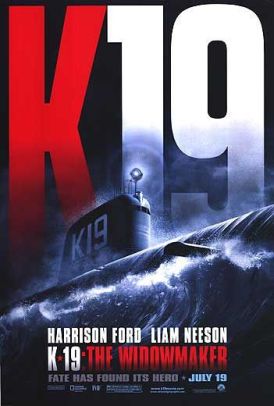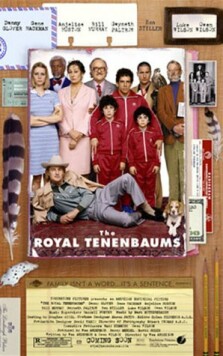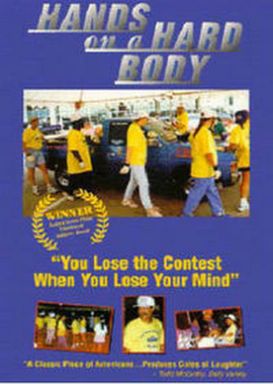K-19: The Widowmaker
At the beginning of K-19: The Widowmaker, directed by Kathryn Bigelow, a notice — or a series of notices — on the screen not only tells us that the story we are about to see is “inspired by actual events” and that these events remained secret for 28 years but also fills us in on the political background of the period, which is secret only to historical and political illiterates. In 1961, we learn, the Soviet Union had enough nuclear weapons to destroy the world twice over. The United States, meanwhile, had enough to destroy it ten times over. And what do you think? “Both continued to build more”! What could they have been thinking?
Oh dear. I seem to remember that that kind of thinking was the stock-in-trade of a certain kind of naïve leftism very common back in the 1960s, but it is hardly much of a qualification for anyone purporting to write a true-to-life Cold War drama. Thus, too, Ms Bigelow and her screenwriter, Christopher Kyle (adapting a story by Louis Nowra), are able to tell us. “Powerful men on both sides,” the writing up on the screen goes on, thought that “war is inevitable.” For them it was “just a question of when.” Now you or I might think that powerful men would be foolish indeed, not to say negligent in their exercise of power, if they did not think war was inevitable. So far in human history it always has been.
But the hippie morality of the movie’s opening passages turns out to be only a means of hyping the material, which is a nuclear accident on a prototype Russian sub that was never very likely to have resulted in a nuclear war and in any case did not. In other words, though “inspired by actual events” the movie is not a documentary because the actual events appear to require a glitz infusion from the likes of Harrison Ford and Liam Neeson to be dramatic enough for a movie. Or a “dramatization.” The truer the events, the less we want the dramatization. And, I guess, vice versa.
But even though K-19 is over-hyped and politically naïve and big and overproduced, even though it is full of cheesy dialogue in fake Russian accents, it’s really not bad. As a Cold War drama, it is a disappointment, but in a more general sense, as a portrait of men under intolerable pressures it holds the interest and shows how the drama of all war is very often nothing more than the triumph of human courage and ingenuity over incompetence and stupidity and bad luck. This has nothing to do with politics, or even with winning and losing. It has to do with surviving in spite of the best efforts of one’s superiors to get one killed. This kind of thing will strike a reverberant chord in many an old soldier’s bosom.
The film also deserves credit for not shying away from a portrayal of the corruption, incompetence and inefficiency of the Soviet system which made the hazards endured by its submariners remarkable even by its standards. The submarine is sent to sea as a bluff to American naval intelligence with nothing finished, no back-up systems, the wrong medicine, the wrong equipment and even an uncorrected list to port. Ten of its crew have died in accidents before it has even left drydock. This is why the men call it “the widowmaker” and whisper that their voyage is jinxed. But it also sets the stage for a memorable toast from Captain Polenin (Mr. Neeson) which remembers the otherwise unremembered cosmonaut who was launched into space before Yuri Gagarin but who was “not loyal enough to hold his breath when his life support system gave out.” Consequently, he never existed. “Gagarin was lucky,” says the Captain, raising his glass. “To luck.”
Such bravado seems to me very soldierly — and very Russian. Polenin is considered politically suspect because of his closeness to his men and his willingness to defy authority on their behalf. For this reason an unsmiling martinet, Captain Alexi Vostrikov (Mr Ford), is put over his head as officer commanding on the shakedown cruise. But it turns out that Captain Vostrikov’s eagerness to prove himself loyal owes something to the fact that his father, a former Bolshevik hero, died in the Gulag under Stalin. Not much is made of this interesting fact, however, and the tensions between the two men are pretty much the same as they would have been on an American sub — and were, in fact, between Gene Hackman and Denzel Washington on Crimson Tide — with the difference that Moscow’s orders when K-19 gets into difficulties not to accept help from the Americans are backed up with rather more fearsome penalties for non-compliance.
So what’s your guess? Does the by-the-book Vostrikov obey a suicidal order or risk ending up in the Gulag like his old man? Does the popular Polenin lead a mutiny against him or learn to appreciate his stern devotion to duty? Here’s a hint: remember who the stars are. Mr Ford, reputedly the highest-paid actor in Hollywood, may have left little room in the budget for other first team players besides Mr. Neeson, but this turns out to have been a good thing. The crew, played by such lesser lights and downright obscurities as Peter Sarsgaard, Ingvar Eggert Sigurðsson, George Anton, Shaun Benson, Christian Camargo, Dmitry Chepovetsky, Steve Cumyn and J.J. Feild function as an ensemble cast to give us a sense of the solidarity among the men which is the final product of all the best war movies. This one won’t jeopardize the standing of Das Boot as best submarine movie ever, but it’s worth seeing all the same.
Discover more from James Bowman
Subscribe to get the latest posts to your email.








